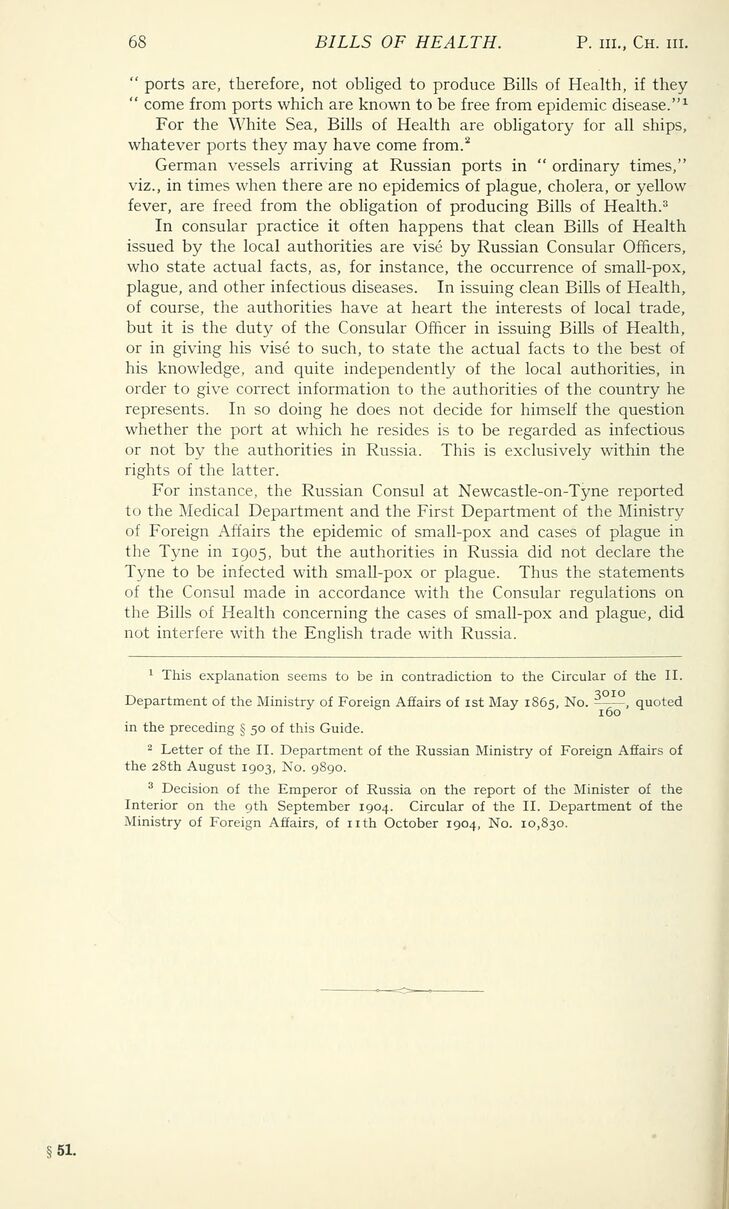
Full resolution (JPEG) - On this page / på denna sida - Pages ...

<< prev. page << föreg. sida << >> nästa sida >> next page >>
Below is the raw OCR text
from the above scanned image.
Do you see an error? Proofread the page now!
Här nedan syns maskintolkade texten från faksimilbilden ovan.
Ser du något fel? Korrekturläs sidan nu!
This page has never been proofread. / Denna sida har aldrig korrekturlästs.
68
BILLS OF HEALTH.
p. т., ch. hi.
" ports are, therefore, not obliged to produce Bills of Health, if they
" come from ports which are known to be free from epidemic disease."1
For the White Sea, Bills of Health are obligatory for all ships,
whatever ports they may have come from.2
German vessels arriving at Russian ports in " ordinary times,"
viz., in times when there are no epidemics of plague, cholera, or yellow
fever, are freed from the obligation of producing Bills of Health.3
In consular practice it often happens that clean Bills of Health
issued by the local authorities are vise by Russian Consular Officers,
who state actual facts, as, for instance, the occurrence of small-pox,
plague, and other infectious diseases. In issuing clean Bills of Health,
of course, the authorities have at heart the interests of local trade,
but it is the duty of the Consular Officer in issuing Bills of Health,
or in giving his vise to such, to state the actual facts to the best of
his knowledge, and quite independently of the local authorities, in
order to give correct information to the authorities of the country he
represents. In so doing he does not decide for himself the question
whether the port at which he resides is to be regarded as infectious
or not by the authorities in Russia. This is exclusively within the
rights of the latter.
For instance, the Russian Consul at Newcastle-on-Tyne reported
to the Medical Department and the First Department of the Ministry
of Foreign Affairs the epidemic of small-pox and cases of plague in
the Tyne in 1905, but the authorities in Russia did not declare the
Tyne to be infected with small-pox or plague. Thus the statements
of the Consul made in accordance with the Consular regulations on
the Bills of Health concerning the cases of small-pox and plague, did
not interfere with the English trade with Russia.
1 This explanation seems to be in contradiction to the Circular of the II.
Department of the Ministry of Foreign Affairs of 1st May 1865, No. quoted
in the preceding § 50 of this Guide.
2 Letter of the II. Department of the Russian Ministry of Foreign Affairs of
the 28th August 1903, No. 9890.
3 Decision of the Emperor of Russia on the report of the Minister of the
Interior on the 9th September 1904. Circular of the II. Department of the
Ministry of Foreign Affairs, of nth October 1904, No. 10,830.
<< prev. page << föreg. sida << >> nästa sida >> next page >>